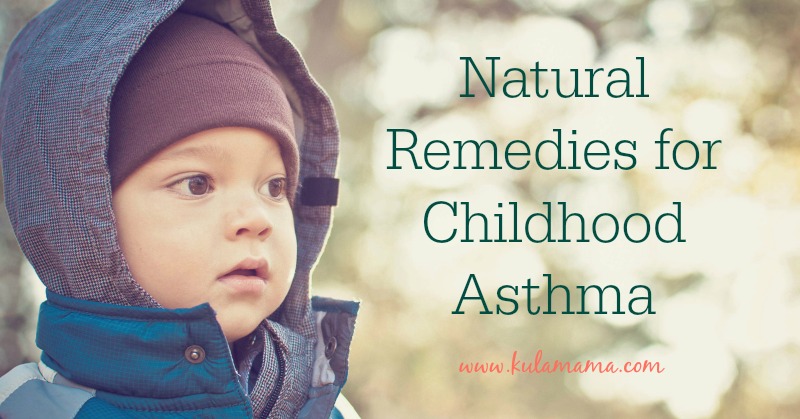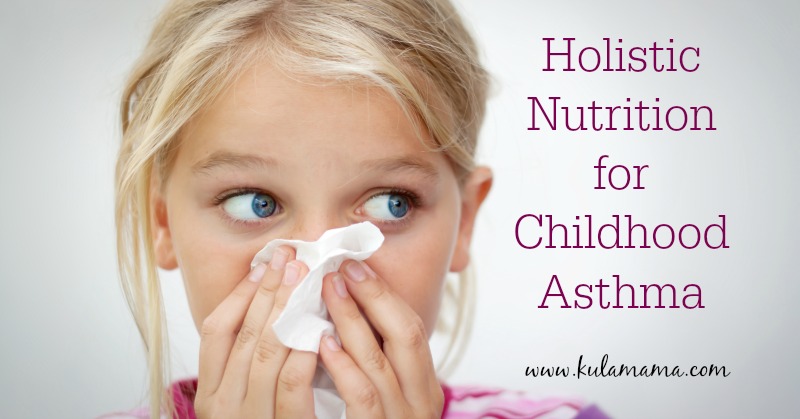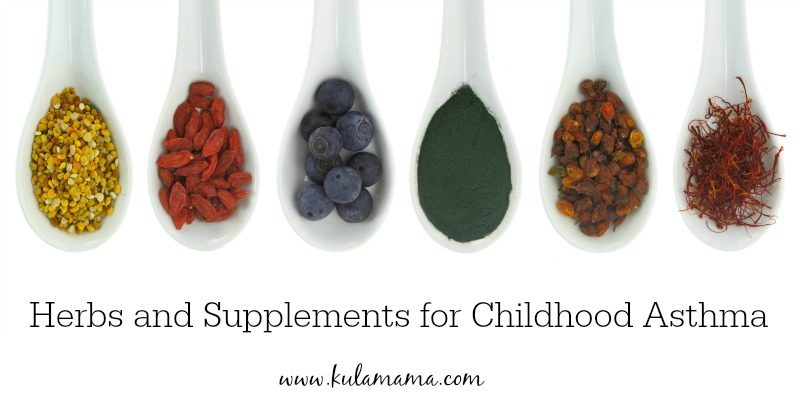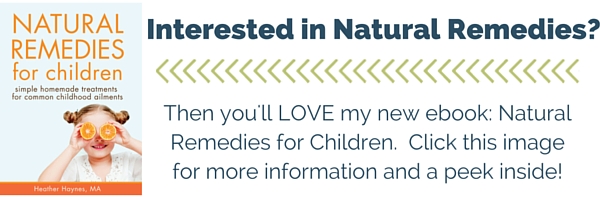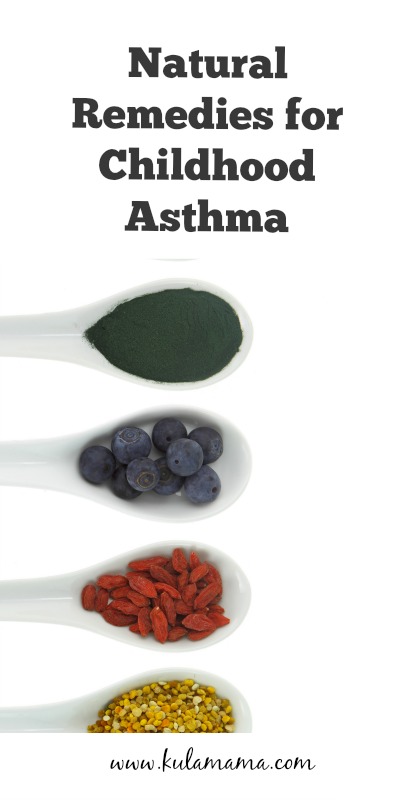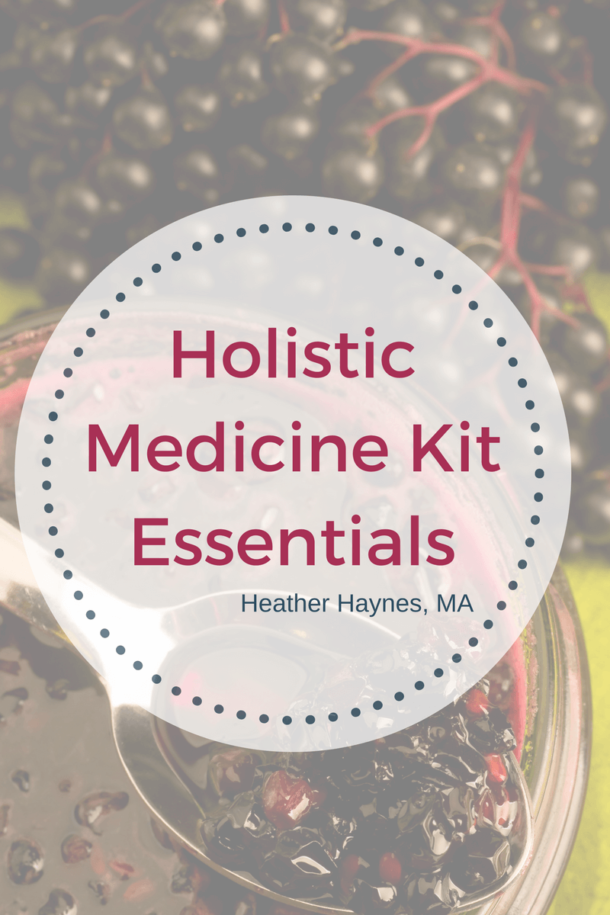Spring has SPRUNG…
For many children, spring means shedding winter clothes, the end of another school year…and for some, spring means new asthma triggers and complications. Childhood asthma affects more children today than ever before. It is estimated that over 6 million children suffer from asthma, a 300 percent increase in the last 20 years. (source) Inquiring minds want to know why our kids are experiencing escalating rates of asthma. Why? Why? Why? I’m afraid I don’t have a concrete answer because there are many potential reasons, including our ever-increasing exposure to environmental toxins, the decreasing levels of nutrients in our food and compromised detoxification pathways in our young generation… to name just a few. We live in a complicated world and there isn’t just ONE cause of asthma across the board for all children, however, there may be a few key triggers for your child specifically.
In this post we will explore areas you can investigate if your child has asthma, and how to holistically support your child’s condition. As always, please see my medical disclaimer and please check in with your doctor if you have any concerns.
What is asthma?
Asthma is a respiratory condition that can be a chronic or occasional problem. Symptoms include wheezing, difficulty breathing, coughing, chest pain or tightness.
What causes asthma?
There are many contributing factors to the development of asthma including a genetic disposition, environmental triggers, imbalanced gut flora, digestive issues, compromised detoxification, impaired immune function, or a diet low in fatty acids. (source, source) According to Dr. Kenneth Bock, a functional MD who specializes in treating children with asthma, allergies, ADHD and autism, the inflammation associated with asthma comes from 3 primary sources. These sources include; infections (virus, bacteria or fungus), allergens (food or environmental) and toxins (heavy metals, air pollution).
What is conventional treatment for asthma?
Conventional treatment for asthma includes prescribing medications that work to relax the muscles of the airways. These drugs can help symptoms quickly, however, the effects only last for a few hours and the side effects of using these medication regularly can cause problems including lowered immune function. (source, source) Additionally these drugs only treat symptoms (which can be very helpful for a child who has trouble breathing!) not the underlying cause of asthma. Asthma attacks can be serious so if your child ever has trouble breathing seek treatment immediately.
Asthma and Inflammation
When a child has asthma, it tells us that inflammation is at play in the body. Additionally, if you have an infant or young child with inflammatory conditions such as food sensitivities/allergies, eczema, acid reflux, constipation/diarrhea, or spectrum disorders it is very important to pay attention to your child’s lung function. These early inflammatory conditions in babies and young children indicate that some level of immune dysfunction may be at play and ultimately almost all cases of asthma are due to inflammation from a confused and overburdened immune system. (source) There are definitely steps you can take to help lower your child’s inflammation, thereby reducing asthma risk and/or the severity of a child’s current asthma condition. Knowledge is power.
Natural Remedies for Childhood Asthma
Holistic Nutrition
Food elimination diet: Food sensitivities can be a contributor to the development of asthma, so doing an elimination diet is critical to identifying food triggers. A food elimination diet removes the most common problem foods from the diet for a period of time and then reintroduces them one at a time to check for reactions. According to Dr. Bock, 90% of children with asthma also have allergies/sensitivities. Identifying food triggers is one key to healing asthma. You may also try adding in a few foods that health advocate, Anthony William, recommends for asthma. These foods include; apricots, onions, and radishes. To learn more about doing an elimination diet check out this book.
Heal the gut: Once you’ve identified your child’s food triggers, it’s time to heal the gut damage that’s likely resulted from eating problem foods over the years. Aloe vera is a powerful gut-healing food. You can sneak it into juice or smoothies- here is a wonderful kid-friendly recipe. Another way to heal the gut is to drink straight celery juice first thing in the morning. This is a method I learned from health advocate, Anthony William, and it has changed my life personally. But I’ll be honest. My 9 year old won’t touch it and my 5 year old chokes it down to please me, but doesn’t like it one bit! It’s one of the best ways to heal the digestive tract so please give it a go if your child is willing! Here are the details. Other gut-healing supplements include; probiotics, b12, and l-glutamine.
High quality omega-3 fats: Some texts indicate an imbalance of fatty acids in the diet may be related to asthma. (source) Focus on reducing your child’s intake of omega-6 fatty acids (vegetable oils) and increasing your child’s intake of omega-3 fatty acids (salmon, walnuts, sardines). Taking a high-quality omega-3 supplement from plant sources is also a great idea.
Reduce intake of immune system busters: Pasteurized dairy, gluten and sugar can add to inflammation and mucous production in the body so eliminating these foods for a period of time may be beneficial and many children with asthma are sensitive to gluten and dairy in general. Certainly any time the child has an allergy attack these foods should be removed as a precaution.
Lifestyle
Green your food, water and home: An increased exposure to toxins from food, water, cleaning and personal care products may contribute to increased inflammation levels in the body (and therefore inflammation in the airways). To help reduce your child’s exposure to these contaminants, green and clean your food, water and home as much as possible. This means buying organic food, dairy and meat products when possible, and using a water filter for your drinking water (and bath water too). You can also eliminate as many environmental triggers in the home as possible by installing HEPA air filters and using non-toxic cleaning and personal care products.
Detox naturally: Encourage ongoing detoxification by giving your child a weekly detox bath with Epsom salts and essential oils known to support healthy respiration. Make sure the bath water is filtered to remove chlorine first by adding vitamin C, baking soda, or use a Dechlorinator. Read about how to give children a safe and effective detox bath in this post. Other healthy ways to detox include sweating, jumping on a rebounder (mini trampoline), taking Hawaiian spirulina (my kids often take this in their smoothies and it also acts as a great natural multi-vitamin) and drinking lemon water.
Stress reduction: Stress can serve as a trigger for systemic inflammation so work to implement stress reduction practices into your child’s life. Mindfulness meditation is a wonderful coping mechanism to teach your child.
Support the adrenals: Low functioning adrenals may contribute to a child’s asthma status. (source) Support your child’s adrenals by encouraging them to eat every 2-3 hours and to try eating foods with the proper nutrients for adrenal health. Here’s a great list of adrenal-friendly snacks.
Boost immune function: Help your child avoid respiratory infections that can trigger asthma symptoms by boosting immune function throughout the year. Here’s my write up about natural immune boosters for kids.
Herbs and Supplements
Ester- C: Vitamin C may help asthma if taken in a low dose as it has been shown to support lung function. 200mg a day on an ongoing basis may help to improve symptoms. Additionally, increasing your child’s intake of vitamin C rich foods like red bell peppers, oranges, and pomegranate seeds may help too. This Vitamin C also contains quercetin to help lower inflammation.
Magnesium: Magnesium calms the smooth muscle tissue in the body. For children suffering from asthma this could help to ease those tight chest muscles. You can give your child frequent Epsom salt baths or use supplement forms such as magnesium oil (externally) or magnesium glycinate (internally).
B vitamins: Some studies suggest that individuals with asthma may be deficient B12 vitamins. Using a B12 supplement may be helpful for children with asthma. This is the only B12 supplement I recommend.
Quercetin: The antihistamine properties of quercetin make it a helpful supplement for helping those with asthma to lower inflammation.
Echinacea and goldenseal: Because many children with asthma have an underlying infection. Using herbs such as Echinacea and goldenseal a few times a month can help to reduce a viral or bacterial load in the body. These herbs should not be used daily but a few times a month (and definitely if a child is sick) can be helpful.
Homeopathy
Children suffering from an asthma attack may benefit from homeopathic remedies. Kalium Carbonicum, Ipecachuana and Antimonium Tartaricum are all potential remedies. (source) In my opinion, it is best to work with a homeopathic doctor if your child suffers from asthma. The correct remedy for your child will depend on his overall symptom profile and a doctor will be able to help you navigate homeopathic treatment options.
Essential Oils
Kid-safe essential oils that may support a healthy respiratory system include Frankincense, Ponderosa Pine and Ravinstara. Combine 1-2 drops of essential oil in 1 teaspoon of carrier oil and apply to back of neck, chest and/or bottom of feet. (source)
Recommended Reading
If you have a child with asthma, I highly recommend reading the following books:
Healing the New Childhood Epidemics: Autism, ADHD, Asthma and Allergies by Kenneth Bock, MD
Digestive Wellness for Children by Elizabeth Lipski
Life-changing Foods by Anthony William
Read More from my Natural Remedies Series
Natural Remedies for Ear Infections
Natural Remedies for Childhood Constipation
Natural Remedies for Sinus Infection
Natural Remedies for the Common Cold
Natural Remedies for Stomach Flu
Natural Remedies for Croup and Cough
Medical Disclaimer: I’m not a doctor and don’t play one on the internet. This post is not to be considered a replacement for medical advice, diagnosis, or treatment. Please always use your best judgement and seek the advice of your health professionals as needed.

